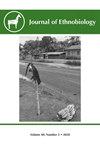Three Criteria for Virtuous Collaboration Across Epistemic Practices: A Case From Sentimentalism and Field Environmental Philosophy
IF 1.3
3区 社会学
Q1 ANTHROPOLOGY
引用次数: 0
Abstract
The present paper proposes three desiderata that methodologies for collaboration between philosophy and ethnobiology should satisfy. The account considers that a focus on a sentimentalist virtue epistemology is necessary to effectively address problems and challenges in such collaborations. Our focus on sentimentalism is further elaborated through three desiderata: (D1) The context of the collaboration should encourage receptivity among practitioners; (D2) collaborations should aim to produce knowledge that addresses the problems faced by stakeholders; and (D3) relevant communities and collaborators for each case should be included by attuning to the conditions of the collaboration. To support our argument, we present the methodology of Field Environmental Philosophy as a case study in which attention to these desiderata is thoroughly present, resulting in a successful collaboration. We argue that these desiderata are crucial for understanding collaborations between philosophy and ethnobiology.认识论实践中美德合作的三个标准——以感伤主义和场域环境哲学为例
本文提出了哲学与民族生物学合作方法论应满足的三个要求。该报告认为,为了有效解决此类合作中的问题和挑战,有必要关注感伤主义的美德认识论。我们对感伤主义的关注通过三个方面进一步阐述:(D1)合作的背景应该鼓励从业者的接受性;(D2)合作应旨在产生解决利益相关者面临的问题的知识;以及(D3)每个案例的相关社区和合作者应根据合作条件纳入。为了支持我们的论点,我们提出了现场环境哲学的方法论作为一个案例研究,在该研究中,对这些需求的关注得到了充分体现,从而促成了成功的合作。我们认为,这些渴望对于理解哲学和民族生物学之间的合作至关重要。
本文章由计算机程序翻译,如有差异,请以英文原文为准。
求助全文
约1分钟内获得全文
求助全文
来源期刊

Journal of Ethnobiology
Social Sciences-Anthropology
CiteScore
4.80
自引率
3.40%
发文量
21
审稿时长
>12 weeks
期刊介绍:
JoE’s readership is as wide and diverse as ethnobiology itself, with readers spanning from both the natural and social sciences. Not surprisingly, a glance at the papers published in the Journal reveals the depth and breadth of topics, extending from studies in archaeology and the origins of agriculture, to folk classification systems, to food composition, plants, birds, mammals, fungi and everything in between.
Research areas published in JoE include but are not limited to neo- and paleo-ethnobiology, zooarchaeology, ethnobotany, ethnozoology, ethnopharmacology, ethnoecology, linguistic ethnobiology, human paleoecology, and many other related fields of study within anthropology and biology, such as taxonomy, conservation biology, ethnography, political ecology, and cognitive and cultural anthropology.
JoE does not limit itself to a single perspective, approach or discipline, but seeks to represent the full spectrum and wide diversity of the field of ethnobiology, including cognitive, symbolic, linguistic, ecological, and economic aspects of human interactions with our living world. Articles that significantly advance ethnobiological theory and/or methodology are particularly welcome, as well as studies bridging across disciplines and knowledge systems. JoE does not publish uncontextualized data such as species lists; appropriate submissions must elaborate on the ethnobiological context of findings.
 求助内容:
求助内容: 应助结果提醒方式:
应助结果提醒方式:


